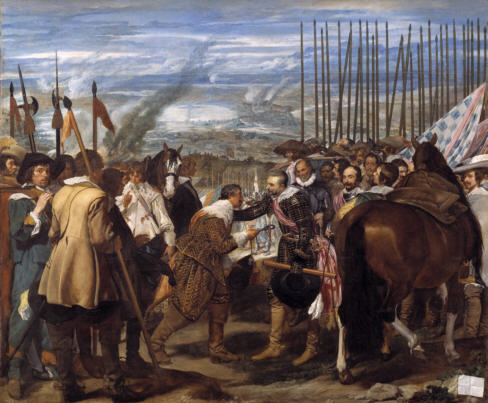
|
|
| About the flawed classic† | |
Advance to Barbarism1968 edition |
|
| Civilized warfare: The Surrender of Breda by Valasquez |
At its conclusion in 1945 the truth concerning several outstanding characteristics of the Second World War was shrouded in official secrecy.
None doubted at the time the polemic assurances which H.M. Ministers had given in Parliament that the air offensive against Germany had been directed solely against military objectives. Later a few began to have doubts. Among the first to express doubts was Captain Liddell Hart who in 1948 wrote that the war had been waged “by the most uncivilized means of warfare that the world had known since the Mongol devastations.”
Among the doubters was the author of this book who in 1948 wrote a short work entitled Advance to Barbarism in which he not only condemned indiscriminate bombing but also the so-called war-crimes trials of captured enemy leaders then in progress.
In 1953 a greatly enlarged version of this book was published in the U.S.A. and attracted wide attention. It was translated into German and published under the title Der Barbarei entgegen (Hamburg, Nolke Verlag, 1954): a second revised edition was published eight years later (Wiesbaden. Priester Verlag, 1962). It was also translated into Spanish and published under the title El Crimen de Nuremberg (Barcelona, Editorial Ahr, 1954).
In the present book speculation has been replaced by a recital of the facts officially disclosed during the past fifteen years. We now know that in March 1942 the British Government adopted the Lindemann Plan by which working-class houses were given top priority as targets for air attack.
War-crimes trials once approved by all but a few lawyers now find few defenders: for example, one of those who remained silent at the time they were taking place has described them as “an act of unwisdom” and another has dismissed the Nuremberg Trials as “a macabre farce.”
From the now established facts here summarised a considered opinion on these subjects can at last be formed.
About the Author
Frederick John Partington Veale was born in Ramsgate in 1897 and was educated at St. Lawrence College. He was admitted a solicitor in 1926. He retired from his legal practice in Brighton in 1965.
From 1923 onwards he was a regular contributor to the Nineteenth Century and After, now the Twentieth Century. He has written numerous articles on historical and political subjects.
In 1931 he visited Russia to collect material for a biography of Lenin he was writing. It was published the following year under the title The Man from the Volga (London, Constable, 1932). It was the first biography of the Bolshevik dictator in English, still then popularly regarded in Britain as a paid agent of the German General Staff: his identity was merged in the public mind with that of his supporter Trotsky. This book was published in France under the title Le Regne de Lenine (Paris. Payot, 1932).
In 1958 was published a book entitled Crimes Discreetly Veiled (London, Cooper. 1958; and New York, Devin-Adair, 1958) in which Mr. Veale set out the facts concerning six, then recent, political trials.
† The book is undeniably a classic but is here described as “flawed” because the author seems to have taken at face value claims of a Jewish Holocaust, illustrating the truism that people more readily fall victim to big lies than small ones.